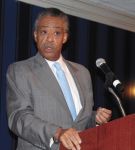NEW YORK (NNPA)—Activist Al Sharpton, keynote speaker at a kickoff prayer breakfast at the National Newspaper Publishers Associations 70th Anniversary Convention last week, warned the more than 215 Black publishers to stay in control of the definition of the Black struggle and to not back down from demanding their fair share of advertising dollars.
“We are meeting because the future of Black America is in this room,” he described the pivotal leadership of the Black Press. He frequently referred to NNPA Chairman Danny Bakewell of the Los Angeles Sentinel, a firebrand leader who has been demanding corporate and federal government fair share of ads for NNPA member papers.
 |
| Rev. Al Sharpton speaks at NNPA convention.
|
Noting that “Danny preaches night and day” on behalf of this cause, Sharpton said corporate America must get the message that their businesses are indebted to Black newspapers.
“They’re not giving us a hand-out. They are in our communities. They owe us in our communities. We have to stop going to these companies like they are doing you a favor to advertise in a market where the margin of their profit comes from in the first place.
So, when they place an ad in your papers, they are respecting the market where they sell their goods. And they should not have access to that market through NBC or ABC or the L.A. Times or the New York Times. They should only have access to that market from you all.”
Bakewell, since he became NNPA chairman last year, has also shaken up Capitol Hill pertaining to fair share of federal advertising dollars.
Sharpton said Obama must not be let off the hook.
“The federal government, the Black president needs to be advertising with the Black Press. Otherwise what does it mean to us if we have Negroes in high places if those on the ground don’t have anything,” he said.
He added that in keeping the heat on advertisers, Black newspapers must adhere to their historic mission of defending Black people and defining the struggle for justice.
“You have the power of definition and you can not give that up because they have made up their mind that if they can change our minds about who we are; then we don’t have to worry about it,” Sharpton preached. “If they take the chains off of our ankles and wrists and put them on our minds, we would change ourselves.”
At the prayer breakfast, an annual staple event off the convention, Sharpton used the story of Joshua to warn the Black publishers to remain focused on who they are and to steadily remind their readers of their own identities.
Just like the children of Israel came over the Red Sea and over the Jordan; then wandered in the wilderness because they began to worship other than the God that had brought them out of bondage, Sharpton preached, “We got in the wilderness and forgot who brought us out of Selma and Montgomery…We got in the wilderness and forgot the God that brought us out. We started imitating the enemy instead of being who we are.”
He concluded: “There’s always been a few that have paid the price for many…We control our own destiny and our Black newspapers have to be the defining factors for that.”